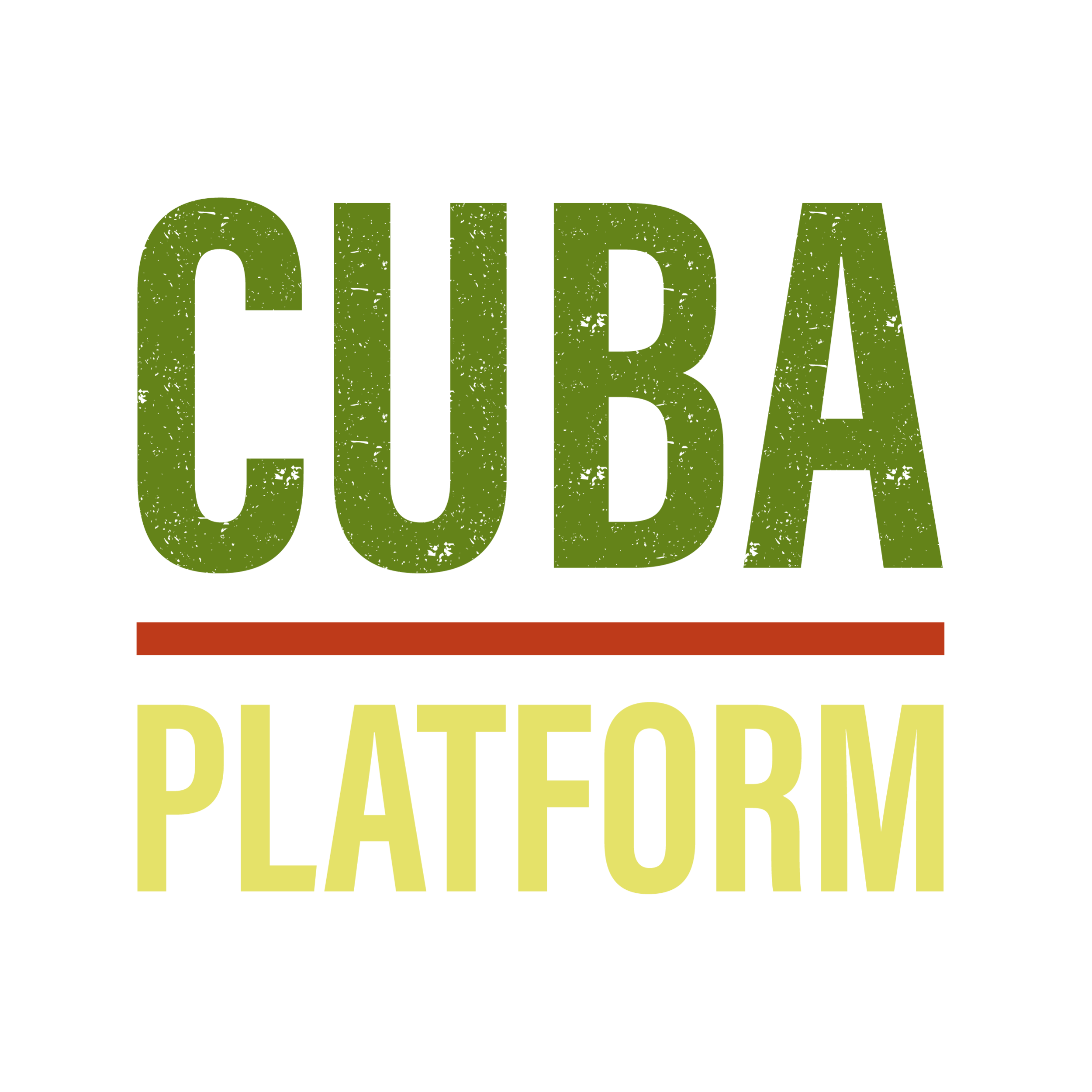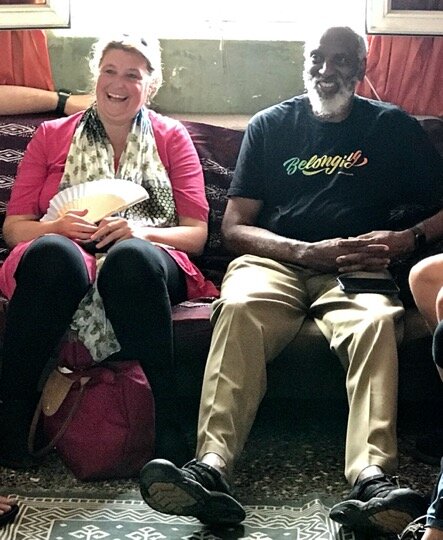Episode 1: Compassion and Belonging with john a. powell and Tania Singer
Survival Skills is a podcast of great conversations between strange bedfellows, sharing ideas for how to make a better world. Produced by Cuba Platform and Care Lab.
Listen here, or on apple podcasts, spotify, or stitcher.
Tania Singer and john a. powell meeting with artists in a private home in Havana, Cuba.
In episode one, Sarah continues a conversation with john a. powell and Dr. Tania Singer on othering, brain science, and pathways to belonging, compassion, and care.
Guests:
john. a powell is director of the Othering + Belonging Institute at the University of California, Berkeley.
Tania Singer is the head of the social neuroscience lab at the Max Planck Society in Berlin, Germany.
Host:
Sarah Stephens is director of the Cuba Platform and Care Lab.
Summary
Click here to read in Spanish.
In July 2019, a group of global changemakers associated with the Atlantic Fellows programs traveled to Havana to meet Cuban counterparts and explore questions of equity, othering, and belonging. Joining them were john a. powell, Director of the Institute for Othering & Belonging at the University of California, Berkeley and Dr. Tania Singer, social neuropsychologist of the Max Planck Society in Germany.
Tania has spent her career designing ambitious research projects that advance the scientific community’s understanding of neuropsychology. john, who has a background in law and has taught in various university departments, is internationally renowned for his analysis of social systems and structures. Although they come from different fields and places, the two discovered that they share a deep interest in the relationship between self and society – and a commitment to expanding belonging and compassion.
In this podcast, recorded several months after their initial meeting in Cuba, Sarah Stephens – who convened the trip – continues a conversation with the two deep thinkers about how we might find a pathway out of today’s inequalities and polarization.
Othering and de-activation of compassion
Many activists and scholars focus on specific lines of inequality or social conflict, such as gender, race, class, and sexual orientation. But as john describes, these issues are driven by a common phenomenon, which he refers to as “othering.” Simply put, “othering is refusing to recognize someone as fully human, as fully equal, as full of dignity…” It is most harmful when carried out in systematic and structural ways by institutions or even governments.
According to Tania, this same phenomenon has been studied by social psychologists, who refer to it as “in group/out group dynamics.”
This dynamic is not new to human societies, but the two agree that it has taken on new dimensions in the contemporary world. “We are having rapid change at a speed that most of us can’t process without tremendous stress,” john notes, “and what we get from our leaders, from culture, from opinion makers is two different stories. One of them is life is happening too fast and we are losing all the things that were important to us… and it is because of those scary people… those others.”
When people become anxious about the speed of change, and begin to feel that their identities are being challenged, Tania says their “threat systems” are activated. When this happens, other motivational systems that psychologists have identified as biologically connected to care and compassion, are turned off.
“When we talk about compassion, love, affiliation in the private life, I think everyone accepts it,” Tania reflects, “but when we talk about economy, you never see any formulation of compassion or affiliation. In a way, I think we have banned the whole need and motivation and care and affiliation – or what you would call belonging and trusting – that is less and less activated because we are working in a system where it is not incentivized.”
And in addition to the fear of change, she reflects that we become “trapped in a loop” of struggling for power, consumption, money, etc., and feeling afraid of losing what you have achieved. So there is a double-activation of the threat system, brought on by the speed of change and fear of losing position.
Expanding the circle of belonging and tolerance
If the problem is “othering,” it is tempting to imagine that the pathway back to more empathy, care and compassion would be to create more inclusive “in groups.” However, john warns against both “saming” and common notions of “inclusion,” which can deny people’s difference and put participation on the terms of the dominant group (think: the military’s don’t ask, don’t tell policy). Instead, the solution he promotes is belonging, which entails a recognition of people’s “full humanity,” and a willingness to “co-create” institutions while “building bridges between people who are apparently different.”
In her work, Tania has been thinking of this as “expanding the circle of human compassion.” When people view each other as part of an “out group,” she says, brain scans reveal that whole parts of their brain fail to light up. What is called the “perspective taking network” of the brain is not in use, and empathic signals don’t fire. “You are not thinking of this person as an intentional being, who has beliefs and intentions and feelings…you dehumanize this person almost as if they were an object.” She is interested in ways that people’s brains can be trained out of this, and toward greater empathy.
Merging inner and outer work: bridging, mindfulness, and perspective
To do this, she and her research colleagues have drawn on contemplative practice in order to help enable people to activate their internal systems of affiliation and care. In a three-month lstudy, they worked with 300 research volunteers who were willing to have their brains and bodies measured as they went through a contemplative program. “We implemented ten minutes of what we call contemplative dyads,” she explained of one of their techniques.” Each week, people were connected with someone else for ten minutes of interactions, during which they asked profound questions and listened to each other quietly. “Though it seems so simple... the dyads really glued the group together.”
Her research suggests the possibility of restoring inner balance and creating more social connectedness, but she says “we have to regain balance in the whole world.. if you don’t change the design of how the system works, inner work is not enough.”
One thing we can do to affect systemic change, john explained, is to change “the stories that we live in.” As we exist in this time of rapid change around technology, demographics, climate change, and pandemic, we can expand belonging by lifting up stories that “let us see how we are connected to each other.”
He mentions the example of Florida Restoration Project, a collaboration led by two men – one black and one white – to restore voting rights to formally incarcerated people. The two have very different backgrounds and political affiliations, but they shared their stories with each other and others in order to work toward the common goal of restoring democracy.
Tania noted that a hopeful example on the governmental level is the United Kingdom’s Ministry of Loneliness, which deals with the impacts of disconnection in society. “I think that we are all longing to reconnect in a deeper way than facebook… if we could reintroduce spaces in cities, have these kinds of [deep listening and compassion] practices in schools, then I guess that slowly, slowly, we could bring this kind of experience into the everyday.”
Reach out
“I think that this idea of slowing down and recognizing that there is value in simply being present with others… it feels to me like a very central part of the way out,” Sarah reflected.
“We have been thinking about this for a long time,” john concluded, “and trying to feel it in the heart, so I would invite your listeners to share with us and reach out to us. This work can be hard, but one of the things that makes it delightful is the people you do it with.”
To learn more or reach out to john, Tania, or Sarah please visit:
Belonging.berkeley.edu
Taniasinger.de
Cubaplatform.org
Since this podcast was recorded, john and the Institute for Othering and Belonging have initiated a collaboration for belonging in Europe, to which Tania is contributing.

